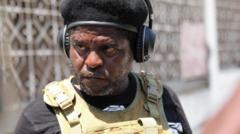Amid ongoing political maneuvering, this case highlights tensions in US-El Salvador relations and escalating deportation practices under President Trump.
**El Salvador Refuses to Return Wrongly Deported Man to US**

**El Salvador Refuses to Return Wrongly Deported Man to US**
El Salvador's President Nayib Bukele stands firm against the return of Kilmar Ábrego García, erroneously deported from the US, despite legal obligations.
In a move that heightens tensions between the US and El Salvador, President Nayib Bukele has stated that his country will not accept the return of Kilmar Ábrego García, a man deported from the US due to what officials described as an "administrative error." Bukele made his remarks during a recent meeting with Donald Trump at the White House, emphasizing the ongoing partnership meant to facilitate the deportation of alleged gang members from the US to El Salvador.
The US Supreme Court's recent ruling called for the Trump administration to "facilitate" Ábrego García's return, as he had previously resided in Maryland with family members and was granted legal protection from deportation in 2019. However, Trump officials, including Attorney General Pam Bondi, argue that the ultimate decision lies with El Salvador regarding the possibility of his repatriation.
Trump's administration has faced considerable backlash over the deportation practices, with the president asserting that he wants to see more American citizens involved in similar actions, especially those defined as violent offenders. During the meeting, he reiterated his quote of promises to deport criminals that pose a threat to society, expressing a keen interest in bolstering El Salvador as a destination for US deportees.
The case of Ábrego García attracted significant attention as his attorney denies allegations of gang affiliation, pointing to inconsistencies and the political nature of his deportation. Meanwhile, the US government has admitted to the administrative error yet continues to categorize him as a member of the notorious MS-13 gang. Bukele's firm stance appears to be motivated not only by legal complexities but also by a desire to cultivate stronger ties with Trump’s administration.
The deportation of Ábrego García and others to El Salvador’s infamous Center for the Confinement of Terrorism (Cecot) raises serious human rights concerns. The prison has faced widespread criticism for its harsh conditions, where overcrowding and lack of basic necessities have been reported, leading to discussions about ethical implications surrounding the detention of deportees.
This situation reflects broader trends in US immigration policy, where apprehensions have surged, and deportations are executed under a controversial law that has been employed since 1798. Trump praised Bukele during the press conference for his tough approach to crime, suggesting that this partnership represents a model for addressing security issues in the hemisphere.
Negotiations between Trump and Bukele have been fruitful, leading to a significant sum paid to El Salvador for each deported individual. Critics of both administrations fear that prioritizing political alliances over human rights may further exacerbate the situation in El Salvador, which has already seen thousands detained without due process amid an enduring state of emergency.
As the legal limbo for Ábrego García continues, his family and advocates express frustration, urging for accountability and proper handling of the situation as they navigate the political landscape that impacts immigrants and their rights.
The US Supreme Court's recent ruling called for the Trump administration to "facilitate" Ábrego García's return, as he had previously resided in Maryland with family members and was granted legal protection from deportation in 2019. However, Trump officials, including Attorney General Pam Bondi, argue that the ultimate decision lies with El Salvador regarding the possibility of his repatriation.
Trump's administration has faced considerable backlash over the deportation practices, with the president asserting that he wants to see more American citizens involved in similar actions, especially those defined as violent offenders. During the meeting, he reiterated his quote of promises to deport criminals that pose a threat to society, expressing a keen interest in bolstering El Salvador as a destination for US deportees.
The case of Ábrego García attracted significant attention as his attorney denies allegations of gang affiliation, pointing to inconsistencies and the political nature of his deportation. Meanwhile, the US government has admitted to the administrative error yet continues to categorize him as a member of the notorious MS-13 gang. Bukele's firm stance appears to be motivated not only by legal complexities but also by a desire to cultivate stronger ties with Trump’s administration.
The deportation of Ábrego García and others to El Salvador’s infamous Center for the Confinement of Terrorism (Cecot) raises serious human rights concerns. The prison has faced widespread criticism for its harsh conditions, where overcrowding and lack of basic necessities have been reported, leading to discussions about ethical implications surrounding the detention of deportees.
This situation reflects broader trends in US immigration policy, where apprehensions have surged, and deportations are executed under a controversial law that has been employed since 1798. Trump praised Bukele during the press conference for his tough approach to crime, suggesting that this partnership represents a model for addressing security issues in the hemisphere.
Negotiations between Trump and Bukele have been fruitful, leading to a significant sum paid to El Salvador for each deported individual. Critics of both administrations fear that prioritizing political alliances over human rights may further exacerbate the situation in El Salvador, which has already seen thousands detained without due process amid an enduring state of emergency.
As the legal limbo for Ábrego García continues, his family and advocates express frustration, urging for accountability and proper handling of the situation as they navigate the political landscape that impacts immigrants and their rights.



















